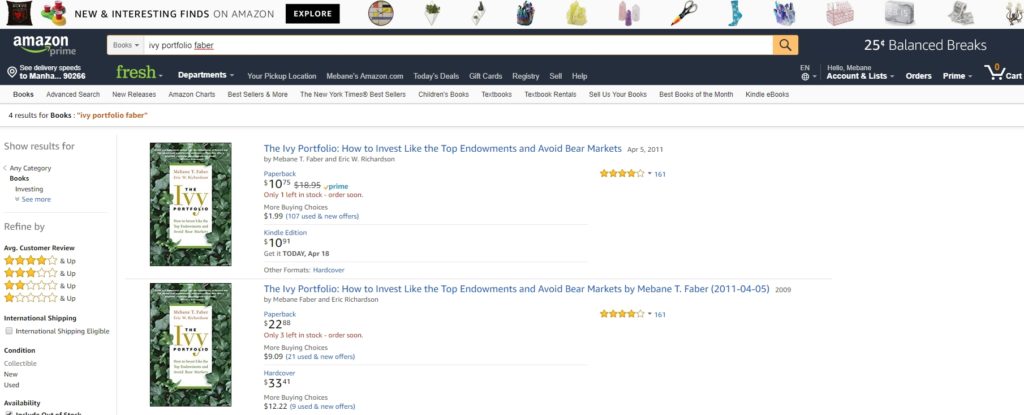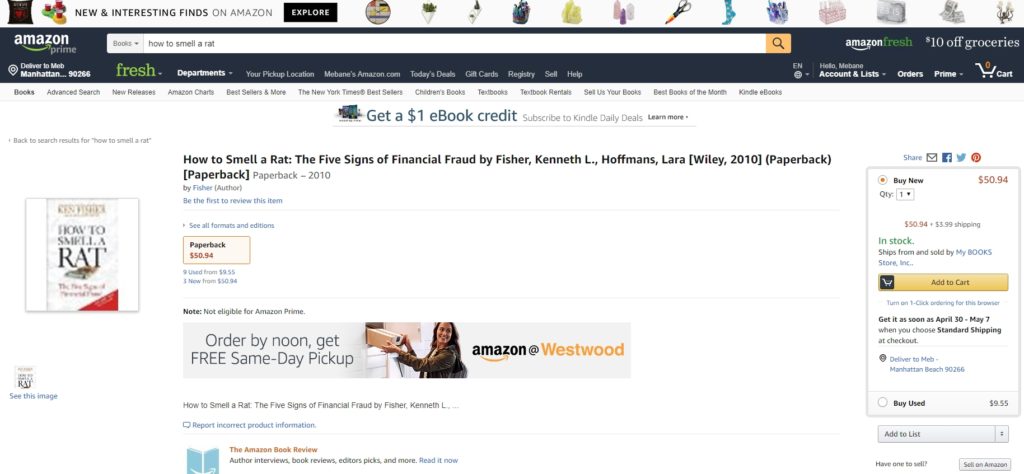If you’ve been following me on Twitter you know that I’ve finally had it with Amazon.
There is a silver lining of course, and the good news for my readers is that all of my books are now free to download.(Sadly I cannot control the two I didn’t self publish…)
If you’re curious why I’m giving up these book proceeds, prepare yourself for a quick-yet-fascinating dive into the world of online scams…
You’ve probably heard much in the media recently about Facebook, fake news, and weaponizing content to influence opinions and elections. You may have seen Mark Zuckerberg dragged in front of Congress to testify about Facebook’s mistakes. Well, what you haven’t heard much of in the media (yet) is how Amazon is an equally bad actor. Whereas Facebook is plagued by fake news, Amazon is littered with fake products. And these fake products encourage fraud and play a role in global money laundering.
About a year ago a reader asked me why one of my books cost $75 on Amazon. If you’ve seen any of my six books online, you know they’re usually in the range of $3 to $10, with the traditionally-published ones a bit more expensive.
I looked into the issue, and discovered that for each of my books there were numerous product listings. So, if you searched for, say, Shareholder Yield, it might return two, four, or even ten listing pages. I found that quite curious since there should only be one home page for any of my books.
Below is a recent example if you search for my first book, The Ivy Portfolio. It returns two versions of the same book, and they look fairly similar. However, you do notice some minor differences such as the weird title and date at the end of the second listing. Also note the second listing is twice as expensive.
(You may have to click to enlarge.)
My first instinct was that enterprising scammers were listing the books at a higher price point in an effort to arbitrage an Amazon search. If some poor, unsuspecting consumer searched for a book they might land on the wrong page, and inadvertently buy the book for the marked-up price.
Trying to better understand and resolve the issue, I contacted Amazon. Here was the laughable response:
“Please allow me to explain you that all 3 books are sold by different sellers that’s why every seller keep different price for item. However, if you can see that the names of the items are somehow different, the changes that has done by seller.”
What the hell does that mean?
Did Amazon just say they are ok with fraud? Imagine going to the grocery store and looking for a six-pack of Pepsi. The legit Pepsi is with all of the other soft drinks and clearly marked for $4. However, over in the bread section there’s a six-pack selling for $10. And another one in the check-out line for $12? Why would you ever trust shopping at that grocery store?
After repeated efforts on my behalf, Amazon eventually took down all of the fake pages. Well, fast-forward three months and they were back. And this is for Meb Faber, an author ranked 29,000 on Amazon. Imagine the scale of fraud for the top 20,000 authors? The top 100? (Though perhaps it makes more sense for the fraudsters to target the long tail of authors who are not in the limelight, who knows?)
I tweeted some more in frustration, but this time I received some interesting responses via email and Twitter.
And it gets worse.
The prior cases are just fraud where someone lists the book, and pretends it is their product. To identify these situations, look for the following red flags:
- Incorrect title (often has the date in the title, and sometimes a weird # at the end)
- No ISBN, or an incorrect one
- Incorrect publication date
- Incorrect publisher
- Fewer or no reviews.
I searched more authors and found that fake pages are the norm. My good buddy Barry Rithotz? Five fake pages. His partner Josh Brown? Only two fake ones. You name the author, chances are they have fake listings. Ken Fisher, who is coming on the pod next week, has NINE fake pages for his book “How to Smell a Rat”. I mean look at the one below where the fraudster is too lazy to even upload a decent book photo!
(Click to enlarge).
If you don’t believe me, take a look at all of the responses to my tweet where my friends and authors realize they also have fake pages…Jim O’Shaughnessy laughably has a fake page where it is his “forth” edition. Ha! (ok maybe not funny to Jim…)
It’s so bad I even offered to send a bottle of wine to the author with the most fake listings. if you find more than nine let me know. I had an author email me that he has FIFTY fake listings…new high score!
But unbelievably, it gets worse.
We’ve seen some straight-up copyright theft where people will steal entire books and publish them.
One reader forwarded this article on Amazon Money Laundering written by Brian Krebs. He argues that serious money laundering is going on with stolen credit cards:
“Reames said he suspects someone has been buying the book using stolen credit and/or debit cards, and pocketing the 60 percent that Amazon gives to authors. At $555 a pop, it would only take approximately 70 sales over three months to rack up the earnings that Amazon said he made.”
The Wall Street Journal even published a short note on the topic too.
So why doesn’t Amazon or Bezos do anything about this? Barry Ritholtz was having a great conversation with Scott Galloway at the end of last year which I believe proffers the best answer:
“This is not about the realm of the possible it’s about the realm of the profitable.”
Not surprisingly, Scott’s book The Four also has fake duplicate listings too.
My guess is eventually you’ll see the government step in, fine the crap out of Amazon, which will then be followed by a multi-billion dollar class-action lawsuit.
In the meantime, I’ve moved all of my books that I control over to my website, and they’re now totally free.
Enjoy…



